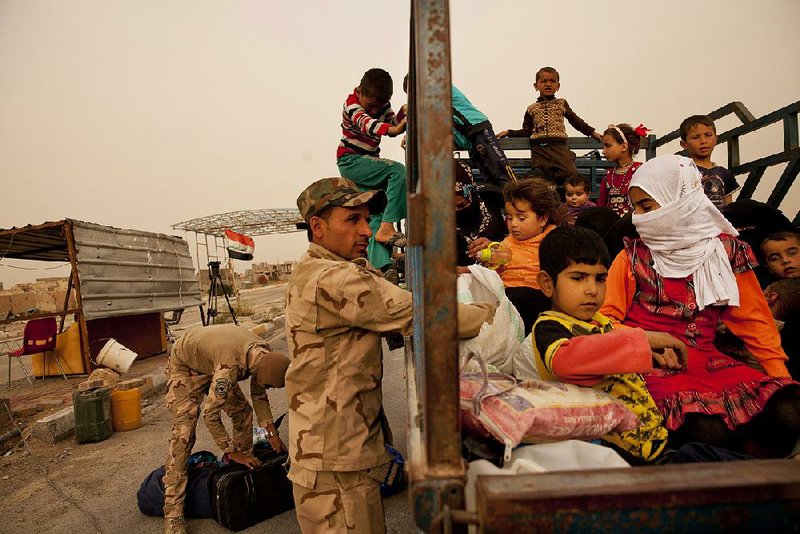AL-TASH, Iraq -- Iraqi security forces, supported by coalition airstrikes, are clearing territory northwest of Baghdad along the Euphrates River valley as they prepare a push to retake the city of Mosul from the Islamic State.
RELATED ARTICLES
http://www.arkansas…">ISIS claims Belgium attacks http://www.arkansas…">Arkansan, wife land to turmoil
But progress has been slowed by skirmishes elsewhere and by a political crisis that prompted the government to pull some forces back to secure the capital.
Amid these distractions, Iraqi forces are concentrating on the Islamic State-held town of Hit in western Anbar province. Commanders say the battle for Hit is key to building on their momentum because it would cut Islamic State supply lines and link government forces to the west and the north of Baghdad in preparation for an eventual push on Mosul.
"Hit is the support line from Syria for Daesh," said Gen. Ali Aboud with Iraq's counterterrorism forces, using an Arabic acronym for the Islamic State. "All of Daesh's logistical support in Anbar comes from that place."
Aboud spoke from a makeshift base in the town of Al-Tash, west of the provincial capital, Ramadi, which now serves as the Iraqis' Anbar command center. Behind Aboud, a team of two men from his unit spoke to Australian coalition troops on a radio, confirming coordinates and calling in airstrikes: one on Hit, another on the outskirts of Ramadi.
But despite coalition support and Iraq's battle-tested counterterrorism troops taking the lead, the operation to retake Hit from the militants, launched weeks ago, has been stalled by political unrest in Baghdad.
Influential Shiite cleric Moqtada al-Sadr mobilized thousands and staged a sit-in outside Baghdad's highly fortified Green Zone on Friday. The cleric in February called for a political overhaul because of growing concern about Iraq's economic crisis -- triggered in part by the plunge in global oil prices.
Al-Sadr's protest was meant to put pressure on Iraq's political leadership. His supporters pushed past razor wire and checkpoints to reach the walls of the Green Zone, home to Iraq's political elite and most of the country's foreign embassies.
"We had to move four battalions back to Baghdad," said an Iraqi counterterrorism commander at the Al-Tash base. Iraq's counterterrorism forces fall under the control of Prime Minister Haider al-Abadi, and some were ordered back to Baghdad late Friday night after al-Sadr's supporters defied a protest ban.
"Honestly, we were supposed to already be in Hit by now," said the commander, who spoke on condition of anonymity because he was not authorized to brief reporters. "Once this problem of protests is solved, we'll be able to make progress again in Hit."
Political disputes in Baghdad have stalled military operations in the past as the country's disparate -- and sometimes clashing -- anti-Islamic State forces have at times struggled to work together cohesively.
The plan to retake Mosul, which has been under Islamic State control for nearly two years, has also faced complications stemming from the Iraqi forces' recent successes on the ground. As the troops advance against the militants, the government's front lines and supply lines have been extended -- increasingly leaving troops exposed to counterattacks.
Aboud said suicide bombings continue to be particularly deadly even as government forces advance northwest across Anbar province.
Early Monday morning, four cars laden with explosives hit an Iraqi military checkpoint along the Euphrates River Valley about 27 miles north of the Hit operation. Iraqi military officials said the attack killed at least five Iraqi troops. Such attacks are increasingly common as Iraqi government forces snake through open deserts that are under neither government nor Islamic State control.
"The car bomb is the only effective weapon Daesh has," Aboud said.
Much of Iraq's north and west fell to the militant group in the summer of 2014, but over the past year Iraq's military has slowly clawed back pockets of territory. While the Islamic State still controls a large swath of Iraq and neighboring Syria, the group has lost an estimated 40 percent of the territory it once held in Iraq, according to U.S.-led coalition officials.
In February, government forces scored a major victory and declared Ramadi, capital of Anbar province, to be "fully liberated."
Counterterrorism forces said more than 10,000 civilians have fled over the past 10 days, as coalition airstrikes on Hit have increased and Iraqi forces have closed in on the town. Most have sought shelter in already overcrowded camps between Hit and Ramadi while others have moved farther east to towns under Iraqi government control.
Despite territorial gains in Anbar by the Iraqi forces, few families have been able to return home. The United Nations estimates that out of more than 3 million displaced people in Iraq, more than 40 percent are from Anbar province.
A Section on 03/23/2016

